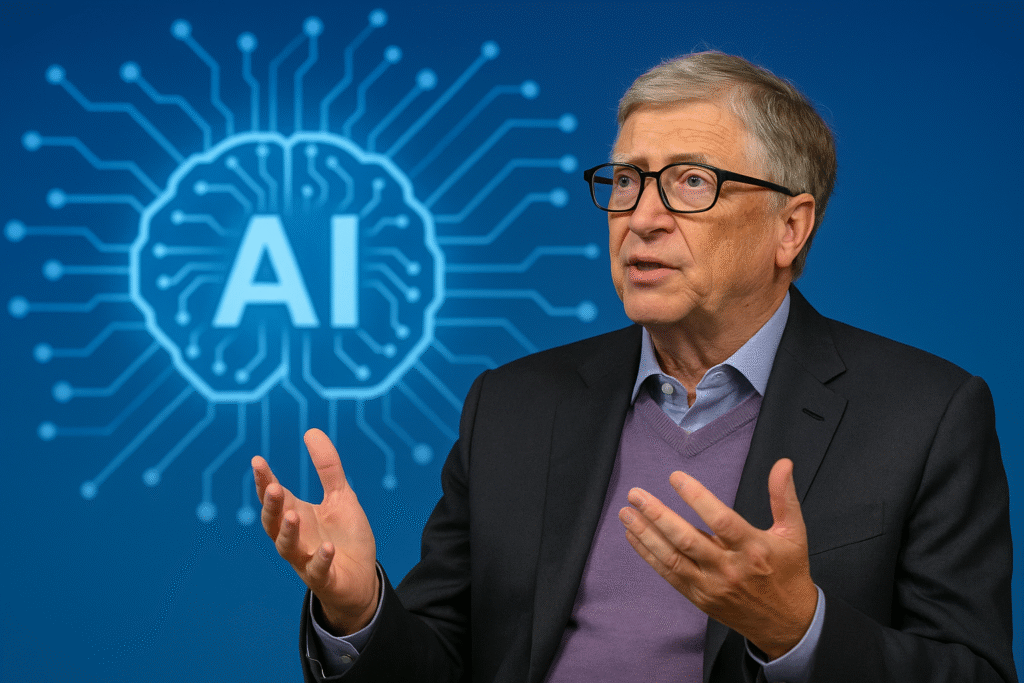Tech titan forecasts job disruption but envisions a future with more leisure time, sparking mixed reactions across industries and media

Summary
Bill Gates stated recently in a discussion that is generating intense international discussion that although AI may result in a large loss of jobs, it may also boost productivity to the point where people are able to take “longer vacations.” Was he actually predicting a post-labor future, or was he just kidding? Let’s look into it.
What Exactly Did Bill Gates Say?
Speaking during a tech forum earlier this year, Gates addressed the duality of AI’s rapid progress. He warned that even being AI-literate may not safeguard one’s job, emphasizing:
“Just knowing how to use AI tools may not be enough. AI will replace jobs—but maybe people will get longer vacations.”
The remark, half-warning and half-vision, has since gone viral.
Was He Serious or Joking?
Gates is known for blending pragmatism with optimism. While the “longer vacations” line carried a hint of humor, multiple sources confirm he was not joking entirely. In fact, it echoes sentiments he has expressed in the past.
In an interview with Quartz’s “New Economy Forum” in 2017, Gates made it apparent that he views automation as a major labor disruptor by proposing a “robot tax” to fund social welfare and offset job losses.
“You would think we’d tax the robot at a similar level if it came in to do the same thing,” he stated.
Despite the jokes, the message aligns with Gates’ long-held conviction that AI will fundamentally alter work-life balance.
Breakdown: What Sectors Are Most at Risk?
Gates outlined that AI and robotics are encroaching on both white-collar and blue-collar jobs: White-Collar Impact:
- These days, ChatGPT and GitHub Copilot are commonly used for simple coding tasks.
- AI is capable of writing media content, analyzing simple data, and creating legal drafts.
- Blue-Collar Impact:
- Robotic arms are improving and may soon handle repetitive factory or warehouse tasks.
- Once dexterity improves, sectors like construction, maintenance, and delivery may see major shifts.
What Do Other Experts Think?
Andrew Ng, AI pioneer:
“We must concentrate on reskilling because AI will create new roles while also displacing existing ones.”
Gates’ motto, “adapt or be left behind,” is echoed by Ng.
Dr. Kate Darling, MIT Media Lab:
“Robots won’t just steal jobs—they’ll redefine them. Human-centered tasks like caregiving and negotiation will be harder to automate.”
Elon Musk (CEO, xAI & Tesla):
Musk, more alarmist, has often warned that AI could render most jobs obsolete. At the 2023 AI Safety Summit in the UK, he said:
“There will be no jobs needed in the future… AI will do everything.”
Media Reactions
Global media outlets had mixed responses:
Positive Spin:
- Gates’ statement was presented as a “vision for AI-enhanced work-life balance” by CNBC and Business Insider.
- “Can AI Give Us a 3-Day Work Week?” was the title of an article published by Forbes.
Skeptical Take:
- The Guardian questioned the claim’s viability, pointing to past instances where productivity increases have inflated corporate profits rather than benefited workers.
- An editorial in the Atlantic titled “Longer vacations for whom? Both gig workers and production line workers are not included.
Gen Z’s Career Shift: Are They Listening?
Interestingly, according to a Zety survey conducted in 2024, 57% of Gen Z respondents are thinking about pursuing skilled trades like carpentry, plumbing, or electrical work. Many say that in an AI-threatened future, job security and practical work are appealing. Compared to previous generations who believed that a college degree was the most secure route, this represents a significant change.
So, What Should You Do?
Gates’ core advice to Gen Z and beyond:
“Be curious, read, and use the latest tools.”
AI won’t just replace jobs—it will redefine value in the workplace. The ability to learn quickly, adapt, and work alongside AI will be essential.
Sources:
- GatesNotes – Bill Gates’ Blog
- Quartz, 2017 – “Bill Gates Proposes Taxing Robots”
- Zety 2024 Gen Z Careers Report
- MIT Media Lab – Dr. Kate Darling on Automation
- The Guardian
- CNBC
- Forbes
- The Atlantic
Conclusion
Bill Gates’ statement—equal parts insight and irony—captures the crossroads we face. Will AI give us more leisure or push more people out of work without a safety net? The answer depends not on the machines, but on how societies prepare, educate, and regulate in the age of intelligent automation.
Disclaimer:
All information in this article is sourced from verified news and research reports. The interpretation of Gates’ comments is based on context, cross-referencing prior statements, and expert opinions.